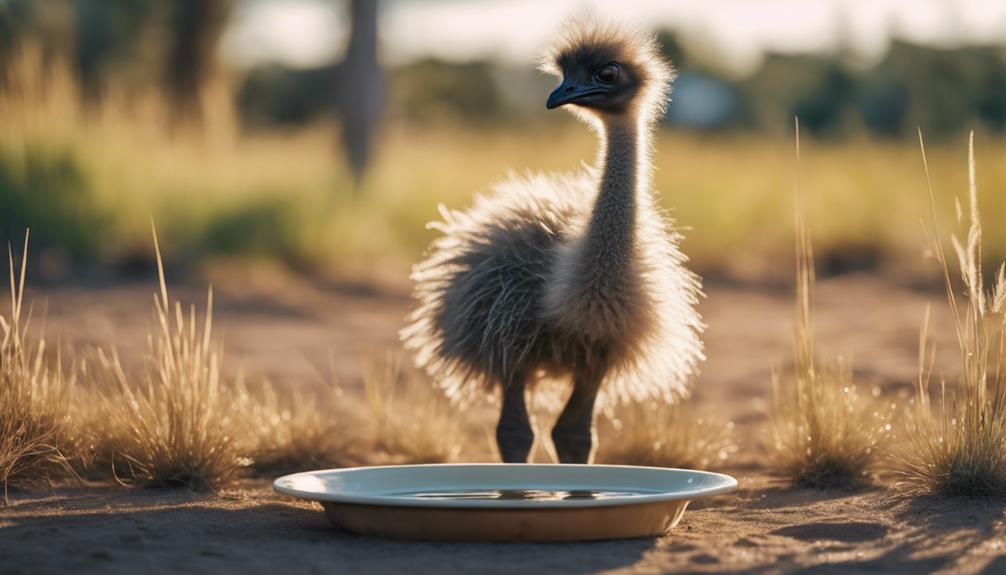
When caring for emu chicks in their first year, your attention to detail plays a crucial role in their development and well-being. From providing a balanced diet to ensuring a safe habitat, every aspect of their care requires careful consideration. By focusing on their diet, environment, health, and social needs, you are setting the foundation for their future growth and happiness. Remember, the first year is a critical period in shaping the lives of these unique birds, and your dedication to their care is key to their success.
Key Takeaways
- Feed emu chicks high-protein starter feed
- Provide fresh greens and grit for nutrition
- Monitor health closely, seek vet care if needed
- Ensure proper temperature, light, and space
- Encourage socialization, handling, and grooming
Emu Chick Diet

When caring for emu chicks, ensuring they've a well-balanced diet is crucial for their growth and health. Emu chicks require a diet rich in protein, vitamins, and minerals to thrive. A diet consisting of a high-quality emu chick starter feed is essential to provide the necessary nutrients for their development. This feed should contain around 24-28% protein to support healthy muscle and feather growth.
Supplementing their diet with fresh greens such as lettuce, spinach, and kale can provide additional vitamins and minerals crucial for their overall well-being. Additionally, offering emu chicks access to grit or small stones is important to aid in their digestion.
It is vital to ensure that emu chicks have access to clean, fresh water at all times. Dehydration can quickly lead to health issues and hinder their growth progress. Regularly check water containers to guarantee they're clean and free of contaminants.
Suitable Enclosure Setup
To create a suitable enclosure setup for emu chicks, prioritize providing a safe and spacious environment that meets their specific needs for growth and well-being. Emu chicks require a secure enclosure that shields them from predators and extreme weather conditions. Ensure the enclosure is constructed with sturdy fencing that's buried underground to prevent digging predators from gaining access. Emus are known for their jumping ability, so make sure the fencing is high enough to prevent escapes.
Emu chicks also need ample space to move around and exercise. The enclosure should be large enough to allow the chicks to run and stretch their legs. Include shelters or shaded areas where the chicks can rest and protect themselves from the sun. Additionally, provide clean bedding, such as straw or wood shavings, to keep the chicks comfortable and maintain good hygiene.
Regularly inspect the enclosure for any signs of wear or damage and make necessary repairs promptly. By creating a suitable enclosure setup, you're setting the foundation for the health and well-being of your emu chicks.
Health Monitoring and Care
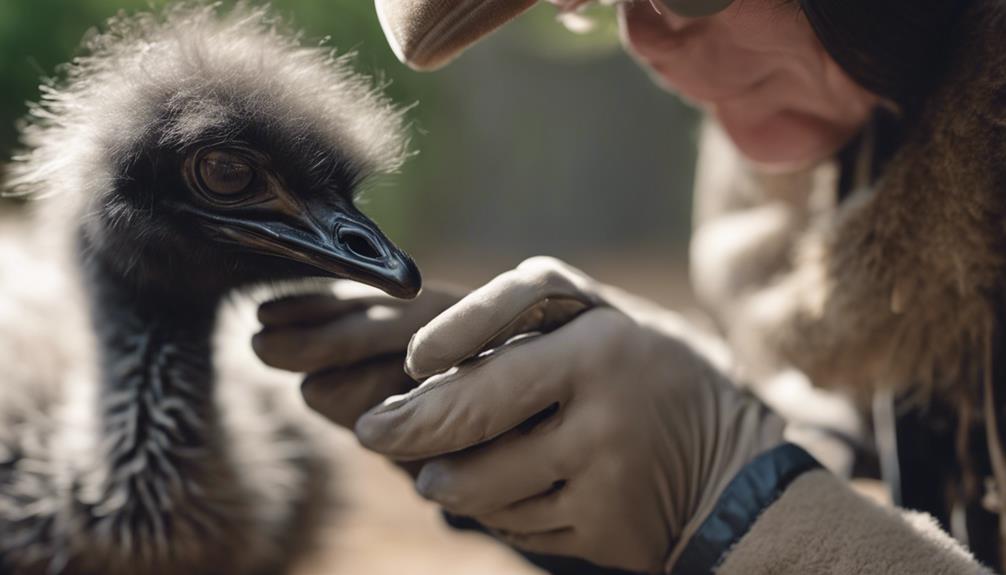
Ensure you conduct regular health monitoring and provide necessary care to maintain the well-being of your emu chicks. Monitoring their health is crucial to catch any issues early on and ensure they thrive. Here are some key steps to consider:
- Regular Health Checks: Schedule routine health check-ups to monitor their weight, overall condition, and look for any signs of illness or distress.
- Proper Nutrition: Provide a balanced diet rich in nutrients essential for their growth and development. Consult with a veterinarian or avian specialist to ensure their nutritional needs are met.
- Hygiene Maintenance: Keep their living environment clean and dry to prevent the spread of diseases. Regularly clean their enclosure and ensure fresh water is always available.
- Prompt Veterinary Care: If you notice any abnormal behavior, changes in appetite, or other concerning symptoms, seek prompt veterinary care. Early intervention can make a significant difference in their recovery.
Socialization With Other Emus
Maintaining the well-being of your emu chicks also involves fostering healthy socialization habits with other emus. Socializing your emu chicks with their peers is crucial for their overall development and well-rounded behavior. Emus are naturally social birds, and interaction with other chicks helps them learn proper communication, establish hierarchies, and develop important social skills.
When introducing emu chicks to each other, ensure that the environment is spacious enough to prevent overcrowding and allow for natural interactions. Monitor their interactions closely to prevent any aggressive behavior and intervene if necessary. Providing enriching activities such as foraging together can help strengthen their bond and promote positive social behaviors.
It is essential to introduce emu chicks to other chicks of similar age and size to prevent any dominance issues. Additionally, ensure that they have access to clean water, food, and shelter to minimize stress during socialization. By carefully managing their interactions and environment, you can help your emu chicks develop strong social bonds that will benefit them throughout their lives.
Managing Temperature and Light
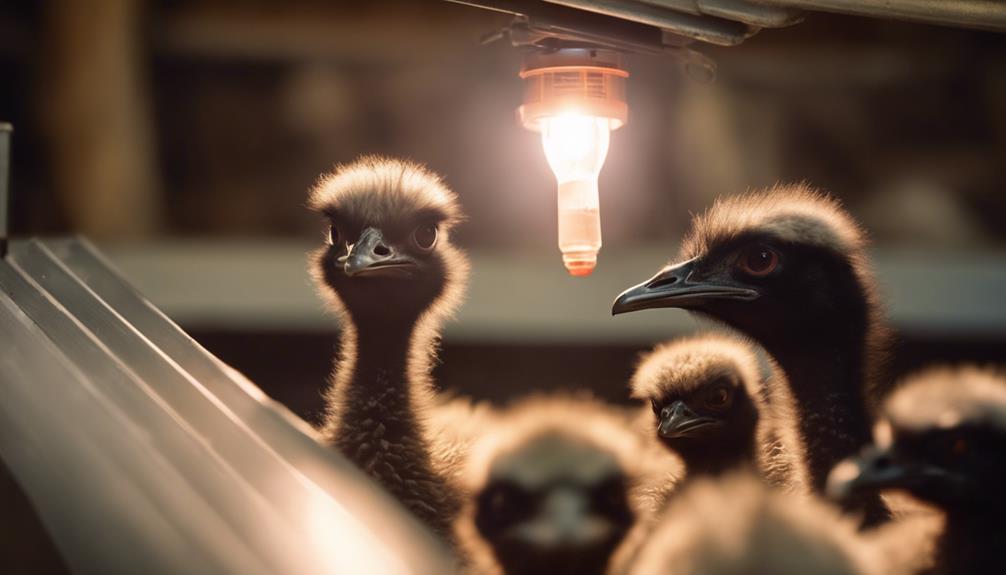
Managing the temperature and light conditions for your emu chicks is crucial for their health and growth. To ensure optimal care, follow these key guidelines:
- Temperature Control: Maintain a brooder temperature of around 85-90°F during the first week of life, then reduce it by 5°F each week until reaching a stable temperature of 70-75°F. Use heat lamps or heating pads to regulate the temperature effectively.
- Light Exposure: Provide your emu chicks with 24 hours of light during their first week to encourage eating and drinking. Afterward, gradually reduce the light exposure to 12-14 hours a day to mimic natural day-night cycles. This will help in establishing healthy sleep patterns.
- Monitor Behavior: Watch for signs of overheating or chilling in your emu chicks, such as panting or huddling together excessively. Adjust the temperature and light levels accordingly to keep them comfortable.
- Regular Adjustment: Regularly assess the temperature and light levels in the brooder to ensure they're within the recommended range. Make adjustments as needed to create a comfortable environment for your emu chicks to thrive.
Providing Adequate Space
To promote healthy development, it's essential to provide adequate space for your emu chicks as they grow. Emu chicks require ample room to move around freely, exercise, and exhibit natural behaviors. Insufficient space can lead to stress, aggression, and stunted growth. When designing their living area, ensure that each chick has at least 8-10 square feet of space initially, increasing to 40-50 square feet as they mature.
A well-ventilated and predator-proof enclosure is crucial to their safety and well-being. Emu chicks are curious and can easily injure themselves if the space isn't secure. Additionally, the enclosure should have a sheltered area where the chicks can rest and seek refuge from extreme weather conditions.
Providing a spacious environment will also prevent overcrowding, which can result in territorial disputes and unhealthy competition for resources. Regularly monitor the cleanliness and condition of the space to maintain optimal hygiene levels. By offering adequate space, you're creating a conducive environment for your emu chicks to thrive and develop into healthy, robust adults.
Handling and Taming Techniques
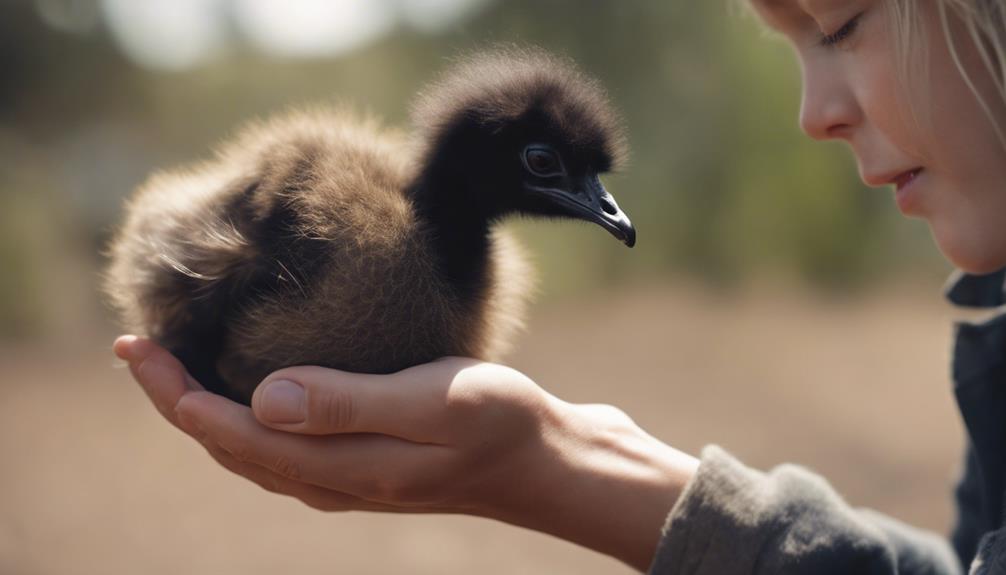
When handling and taming emu chicks, it's essential to approach them calmly and confidently to establish trust and build a positive bond with the birds. Here are some techniques to help you effectively handle and tame emu chicks:
- Start Early: Begin handling the chicks when they're young to get them accustomed to human interaction early on.
- Use Slow Movements: Make slow, deliberate movements when approaching the chicks to avoid startling them.
- Offer Treats: Use treats like mealworms to encourage the chicks to approach you and associate you with positive experiences.
- Consistent Interaction: Spend regular, consistent time with the chicks to build trust and familiarity.
Emu Chick Feeding Schedule
Establishing a consistent feeding schedule for your emu chicks is vital to ensure their proper growth and development. Emu chicks require a carefully planned feeding routine to meet their nutritional needs and promote healthy development. During the first few weeks of life, feed your emu chicks a high-quality emu starter feed specifically formulated for their growth requirements. Offer small amounts of feed multiple times a day to ensure they're receiving adequate nutrition. As they grow, gradually increase the amount of feed provided while reducing the frequency of feedings.
After the initial growth phase, emu chicks can transition to a more structured feeding schedule. Provide a mix of emu starter feed and fresh greens to support their dietary requirements. Aim to feed your emu chicks three times a day, offering a balanced diet that meets their protein and nutrient needs. Monitor their growth and adjust the feeding schedule as needed to promote optimal health and development. Remember, a consistent feeding routine is key to raising strong and thriving emu chicks.
Preventing Common Illnesses
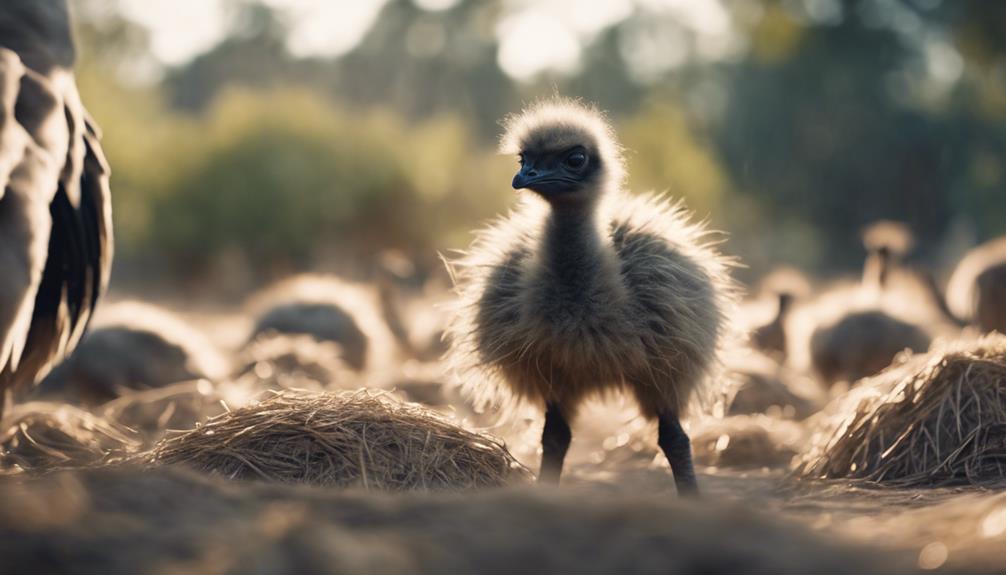
One crucial aspect of raising healthy emu chicks is implementing preventive measures against common illnesses. To ensure your emu chicks stay strong and vibrant, consider the following tips:
- Maintain a Clean Environment: Regularly clean and disinfect the brooder area to prevent the spread of harmful bacteria and parasites.
- Provide Proper Nutrition: Offer a well-balanced diet rich in protein and essential nutrients to boost their immune system and overall health.
- Monitor Hydration: Ensure emu chicks have access to clean, fresh water at all times to prevent dehydration, especially during hot weather.
- Regular Health Checks: Schedule routine check-ups with a veterinarian who specializes in bird care to detect any health issues early on and provide appropriate treatment.
Emu Chick Behavioral Tips
To foster positive behaviors in emu chicks, focus on creating a stimulating and enriching environment that encourages natural instincts and social interactions. Emu chicks are naturally curious and social creatures, so providing them with ample space to explore, interact, and exercise is essential for their behavioral development. Encourage their natural foraging instincts by scattering treats around their living area, stimulating their minds and bodies. Additionally, setting up obstacles and hiding spots can promote mental agility and problem-solving skills.
Social interaction is crucial for emu chicks' well-being. Ensure they have companions of a similar age to engage with, as this fosters social skills and reduces stress. Emus are naturally hierarchical, so observe their interactions to ensure they're getting along and no bullying is occurring. Creating a routine for feeding, watering, and playtime can also help establish a sense of security and predictability for the chicks, leading to a more stable and content behavioral outlook.
Nurturing Growth and Development
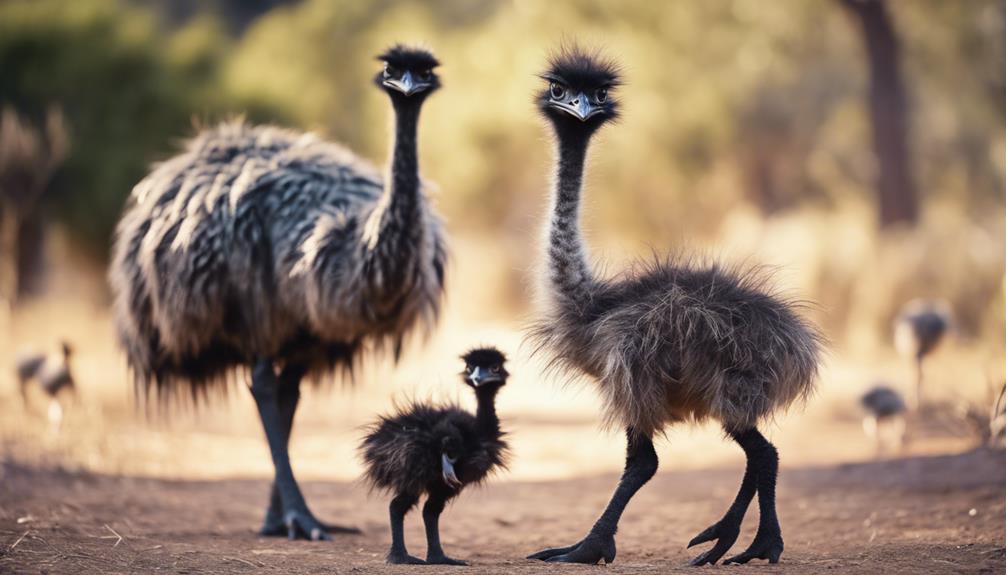
Creating a nurturing environment is essential for the growth and development of emu chicks, ensuring they thrive both physically and behaviorally. To foster optimal growth and development in your emu chicks, follow these powerful tips:
- Proper Nutrition: Offer a balanced diet rich in protein, vitamins, and minerals to support healthy growth. Consider consulting with a veterinarian specializing in avian nutrition to create a suitable feeding plan.
- Adequate Space: Provide ample space for your emu chicks to move around freely. Enclosed outdoor areas or spacious pens with access to sunlight are ideal for promoting physical development.
- Social Interaction: Emu chicks thrive in the company of their peers. Encourage socialization by raising multiple chicks together, allowing them to learn important behaviors from one another.
- Regular Monitoring: Keep a close eye on your emu chicks' progress. Monitor their growth, behavior, and overall well-being regularly to address any issues promptly and ensure they're on the right track for healthy development.
Emu Chick Grooming and Hygiene
For optimal health and well-being, maintaining proper grooming and hygiene practices for your emu chicks is fundamental. Emu chicks require regular grooming to thrive and stay healthy. Start by ensuring that their living environment is clean and dry, as this will help prevent the buildup of bacteria and parasites. Regularly clean their bedding and nesting area to maintain a hygienic living space.
Emu chicks, like adult emus, enjoy dust baths. Providing a shallow container filled with fine sand or dust allows them to clean their feathers and skin naturally. This helps control oiliness and removes dirt, promoting healthy plumage.
Check your emu chicks regularly for any signs of mites or lice. These parasites can cause discomfort and harm to your chicks if left untreated. If you notice any issues, consult with a veterinarian for appropriate treatment options.
Lastly, ensure your emu chicks have access to fresh, clean water for drinking and bathing. Proper hydration is essential for their overall health and well-being. By following these grooming and hygiene practices, you can help your emu chicks grow into healthy and thriving birds.
Frequently Asked Questions
Can Emu Chicks Be Trained to Do Tricks or Perform Tasks?
You can train emu chicks to do simple tasks and tricks with patience and consistency. Start with basic commands like recall or target training. Positive reinforcement methods work well. Remember to keep training sessions short and enjoyable.
What Is the Average Lifespan of an Emu Chick in Captivity?
In captivity, the average lifespan of an emu chick is around 10 to 15 years. Providing proper care, nutrition, and a safe environment can significantly impact their longevity and overall well-being.
Do Emu Chicks Need Toys or Enrichment Activities for Mental Stimulation?
To ensure optimal mental stimulation, emu chicks benefit from toys or enrichment activities. These additions can prevent boredom, promote curiosity, and encourage healthy development. Incorporating such items into their environment will help keep their minds engaged and active.
How Do Emu Chicks Communicate With Each Other and Their Caregivers?
Emu chicks communicate through vocalizations, body language, and behaviors. They express needs, emotions, and establish social bonds. As caregivers, observe their cues, respond promptly, and build trust by meeting their requirements. Consistent interactions nurture a strong bond.
Are There Any Specific Regulations or Permits Required to Own Emu Chicks as Pets?
To own emu chicks as pets, specific regulations and permits are often required. It is crucial to research and comply with local laws to ensure proper care and legal ownership. Failure to do so could result in penalties.
Conclusion
In conclusion, by providing a balanced diet, secure enclosure, regular health monitoring, socialization, proper temperature and light management, and attentive care, you can ensure a healthy and happy first year for your emu chicks.
Remember, nurturing their growth and development, grooming, and hygiene are essential for their well-being.
Embrace the journey of raising these unique creatures with love and dedication, and watch them thrive in your care.


